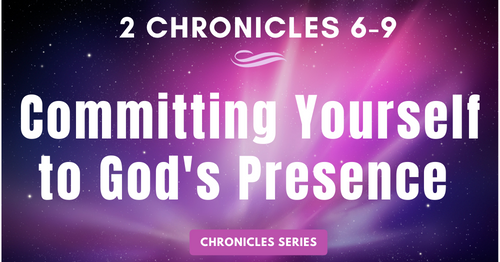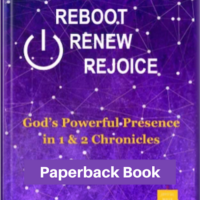2 Chronicles 6-9 • Committing Yourself to God’s Presence

AI was not used to generate this post.
Who has the most influence on you? Is it those who love God wholeheartedly and live obediently to Him? Or is it those who forsake God whenever He gets in their way of what they want out of life? In the last post, we looked at why we as Christians should celebrate God’s presence with us and within us. Yet, we have a continual choice to either embrace God’s presence or forsake Him. This is post #6 in the Chronicles blog series. This article will encourage you to daily commit yourself to His presence and power in your life. Solomon’s bad example shows why this is important.
Key Takeaways
- The article highlights the importance of committing yourself to God’s presence in daily life.
- It contrasts Solomon’s faithfulness with his later decisions that led to forsaking God’s ways.
- Readers are encouraged to embrace God and reject sinful influences from peers and leaders.
- Faith requires a daily choice and trusting in God’s unseen power to guide one’s life.
- Understanding God’s presence brings joy and strengthens commitment to living according to His will.
Listen to this post as a similar podcast from our Reboot Renew Rejoice Bible Study covering the books of 1 and 2 Chronicles in the Old Testament. (11 lessons)
Experiencing the Joy of God’s Presence
The temple was completed. The people were gathered together. Solomon led them in prayer to their faithful, powerful, promise-keeping God. God’s presence came to dwell in this earthly temple declaring it to be His own.
Everyone in Jerusalem that day saw the procession moving the Ark of God from David’s tent to its resting place in the temple. They saw the fire from heaven to the altar, the glory of the Lord above the temple, and the cloud filling the temple. Those who remained at home could only hear about it. I felt sad for them. There was no YouTube video they could watch of this event. I wish I were there!
After Solomon’s very public act of installing the ark in its proper place, he praised God for keeping His promises to Israel, especially those promises God had made to David that Solomon would be king and the temple would be built.
He said: “O Lord, God of Israel, there is no God like you in heaven or on earth-you who keep your covenant of love with your servants who continue wholeheartedly in your way. … “Now, my God, may your eyes be open and your ears attentive to the prayers offered in this place. (2 Chronicles 6:14, 40)
Solomon was choosing to submit to God as his own ruler and to God’s covenant with Israel. He followed this declaration with a beautiful prayer for all of Israel and all the situations in which Israelites might find themselves—both personally and nationally. He asked God to be faithful even when He had to discipline His people.
Solomon calls God “my God.” At this point, we see Solomon as a man of faith just like his father David had been. But every man or woman of faith has a choice to embrace or forsake God every day of their lives.
Choosing to Embrace or Forsake God’s Presence
There is a choice. Embrace or forsake. There is no in-between. The choice is to embrace God and forsake sinful ways. But the opposite of embracing God is to embrace other gods, worshiping and serving them. When Israel made that choice, the consequence would be loss of their land, loss of their temple, and loss of their reputation as righteous people. We know this happened 500 years later.
Prophets called people back to God
For 500 years, God in His goodness sent prophets repeatedly to His people to draw them back to embrace Him when they would forsake Him and stray away. Finally, He had enough. God knew that the only thing that would bring His people back to their senses and back to Him was total loss of what they loved more than loving Him—home and freedom.
God wants His people to embrace Him and forsake what is not Him. Being in a nice cushy protected environment does not do it. God knows that about people.
I ran across some verses in Isaiah chapter 26 that literally grabbed my attention. Listen to this,
When your judgments [God] come upon the earth, the people of the world learn righteousness. But when grace is shown to the wicked, they do not learn righteousness; even in a land of uprightness they go on doing evil and do not regard the majesty of the Lord. (Isaiah 26:9-10)
Isn’t that amazingly true! When grace is shown to the wicked, they do not learn righteousness. They go on doing evil and do not regard the majesty of the Lord.
What Causes a People to Forsake Their God?
What causes a people to forsake their God who has been so good to them? The influence of one’s peers can certainly do it.
The influence of peers to forsake God
Paul says this in 1 Corinthians 15,
Do not be misled: Bad company corrupts good character. (1 Corinthians 15:33 NIV)
The Israelites had not completely removed the idol worshipers from their land during the conquest. Four hundred years later many of them were still there. So Solomon turned them into his labor force.
All the people left from the Hittites, Amorites, Perizzites, Hivies and Jebusites (these people were not Israelites), that is, their descendants remaining in the land, whom the Israelites had not destroyed—these Solomon conscripted for his slave labor force. (2 Chronicles 8:7-8)
Solomon had cheap labor for all those building projects of his—the magnificent temple, Jerusalem’s mighty buildings, and the fortified cities. The temple probably would not have been built without them. But it was a bad idea to keep those people hanging around. By keeping those Canaanites in the community of Israel, that allowed them to reproduce and continue worship of their own gods (Baal, Asherah) on the high places, which is what they did.
Those people who worshiped idols were like pockets of pus infecting the land. Their idols were enticing to the Israelites because they were carved images—something visible. God had forbidden carved images representing Him. And the farmers who worshipped those idols and the false gods they represented were promised good crops as a reward of their idol worship. That was very enticing.
Then, Solomon married wives from each of those people and all the other surrounding nations. Every one of them brought their own gods into his palace. God had forbidden that and for a very good reason. The Chronicler did not record what happened. But we can see what happens in the book of 1 Kings.
As Solomon grew old, his wives turned his heart after other gods, and his heart was not fully devoted to the Lord his God, as the heart of David his father had been.” (1 Kings 11:4)
Forsaking God happened to Solomon. He led others to forsake God by his actions as a leader.
The influence of leaders to forsake God
Solomon built worship spots on the high hills for each of the gods of his wives and offered sacrifices to those gods there.
On a hill east of Jerusalem, Solomon built a high place for Chemosh the detestable god of Moab, and for Molech the detestable god of the Ammonites. He did the same for all his foreign wives, who burned incense and offered sacrifices to their gods (1 Kings 11:7-8)
Solomon became a cosmopolitan ruler. Anything goes—a little bit of our God, a little bit of our neighbors’ gods. Solomon had forsaken “my god” and embraced other gods as his own.
When your leader is doing this, that gives permission for you as a people to do it as well. When Solomon died after a forty-year reign as king, the kingdom divided into two nations. There was little hesitancy on the majority of the northern ten tribes to just forsake God and embrace idols instead, sacrificing to them on high hills. The influence of those idol worshipers dwelling in the tribal areas that became the northern kingdom infected Israel badly.
The allure of bad character
What is the allure of bad character that draws us down? A friend and I were talking about this the other day. If you hang around a group of women for several days who are not embracing Christ and approaching life His way, it is more likely that you will pick up their bad ways of being negative, critical, and mean. They are less likely to pick up your good ways of being kind and compassionate toward each other.
Bad character is like an infection. The only way to stay healthy is to embrace God fully and forsake anything that is not God. You must forsake anything that is not His way of approaching life. That is a pre-decision—a choice made ahead of time knowing that you will be exposed to spiritual infection.
Solomon did not do that like David his father had done. Solomon got infected as did many of the people who were influenced by him. They may have recognized God’s reality, but they did not commit themselves to His presence.
Commit Yourself to God’s Presence Every Day
Christians live by faith in an ever-faithful, always present God.
Faith is a matter of loving God wholeheartedly
When you love God wholeheartedly, you want to live life His way in obedience. You commit yourself to doing that.
and that you may love the Lord your God, listen to his voice, and hold fast to him (Deuteronomy 30:20)
Jesus replied: ” ‘Love the Lord your God with all your heart and with all your soul and with all your mind.’ This is the first and greatest commandment. And the second is like it: ‘Love your neighbor as yourself.’ (Matthew 22:37-39)
Faith involves hope in the unseen
So we fix our eyes not on what is seen, but on what is unseen. For what is seen is temporary, but what is unseen is eternal. (2 Corinthians 4:18)
Now faith is being sure of what we hope for and certain of what we do not see. (Hebrews 11:1)
Faith risks believing that God is enough to meet any need
And my God will meet all your needs according to his glorious riches in Christ Jesus. (Philippians 4:19)
Faith does not require an “experience seeing God.”
Faith does not require seeing the glory cloud or the golden ark in front of our face in order to believe that God is real. In fact, many of those who saw God’s physical presence on a daily basis did not commit to being obedient followers of God. Those Israelites in the Sinai wilderness who saw God’s presence constantly did not obey God and march into their Promised Land to conquer it when given the first opportunity to do so. They rebelled. They did not commit themselves to the power of God’s presence.
Solomon saw God’s glory cloud, heard directly from God in a dream and through prophets, yet still went against God’s ways later in his life.
Faith is a daily choice
It is a daily choice to commit yourself to the power of God’s presence in your life. He is with you. You are to live dependently upon Him as though He is truly Lord of your life, not just an appendage. If you want to learn more about living dependently on Him, I recommend The God-Dependent Woman Bible Study covering 2 Corinthians.
As Paul wrote in Galatians chapter 2,
I have been crucified with Christ and I no longer live, but Christ lives in me. The life I now live in the body, I live by faith in the Son of God, who loved me and gave himself for me. (Galatians 2:20)
That is commitment to the power of Jesus Christ in us. The Bible says He is here with us and in us. When we commit to living by His power and not our own, then we can truly live!
Let Jesus satisfy your heart with the power of His presence. Then, live in that power!
Read all the articles in our 1 and 2 Chronicles series. In the next post, we will look at what happens when you take the dangerous road of making excuses.
All of the above information is covered in the Reboot Renew Rejoice Bible Study of 1 and 2 Chronicles.
AI was not used to generate this post.


